Understanding the Timeline of Urine Test Results

Introduction and Overview of Urine Tests
What is a Urine Test?
A urine test is one of the most widely used diagnostic tools in medicine and various industries. It involves the collection and analysis of a urine sample to evaluate the presence of certain substances, indicators of disease, or even illicit drugs. Urine tests are essential for monitoring a person’s health, detecting medical conditions, assessing medication effectiveness, and screening for substance abuse.
There are multiple types of urine tests, each serving different purposes. Some are general tests to assess overall health, while others are designed to detect specific substances, including drugs, alcohol, or metabolites of various chemicals. Among the various forms of urine tests, urinalysis and drug screening are the two most common.
Types of Urine Tests
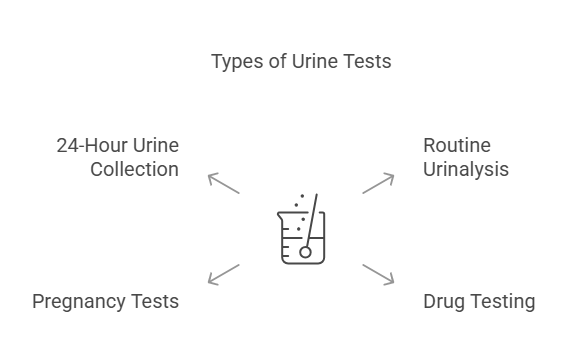
- Routine Urinalysis: This test involves a general evaluation of the urine to assess the function of the kidneys, detect signs of infections, or screen for chronic conditions such as diabetes and hypertension. A routine urinalysis typically includes an examination of the appearance, color, concentration, and pH of urine. Additionally, it checks for the presence of glucose, protein, red blood cells, white blood cells, bacteria, and other substances. This type of test is commonly used by healthcare professionals as part of a physical exam or when a patient shows symptoms of certain illnesses.
- Drug Testing: Drug testing through urine samples is used to detect the presence of drugs and other controlled substances in a person’s system. It is a common practice in employment screenings, especially in safety-sensitive industries, as well as in medical settings for patients on prescribed medications that may have abuse potential. These drug tests can detect a range of substances, including but not limited to marijuana, cocaine, opioids, methamphetamines, and benzodiazepines. A positive result could indicate illicit drug use, prescription medication misuse, or alcohol consumption.Drug testing in urine is often preferred because it provides a reliable window of detection for recent substance use, especially when substances are metabolized and excreted in the urine. Depending on the substance, a urine test may be able to detect drugs from several hours up to several days after consumption. The reliability of urine tests makes them a go-to solution for many employers and healthcare providers.
- Pregnancy Tests: A specific type of urinalysis, pregnancy tests are designed to detect the presence of the hormone human chorionic gonadotropin (hCG) in urine. This hormone is produced during pregnancy, and its detection confirms pregnancy in women.
- 24-Hour Urine Collection: In some cases, urine may be collected over a 24-hour period to assess kidney function, measure the amount of certain chemicals or electrolytes, or test for specific substances. This type of test is usually prescribed when more detailed information is needed regarding kidney health or other metabolic processes.
Why Urine Tests Are Used
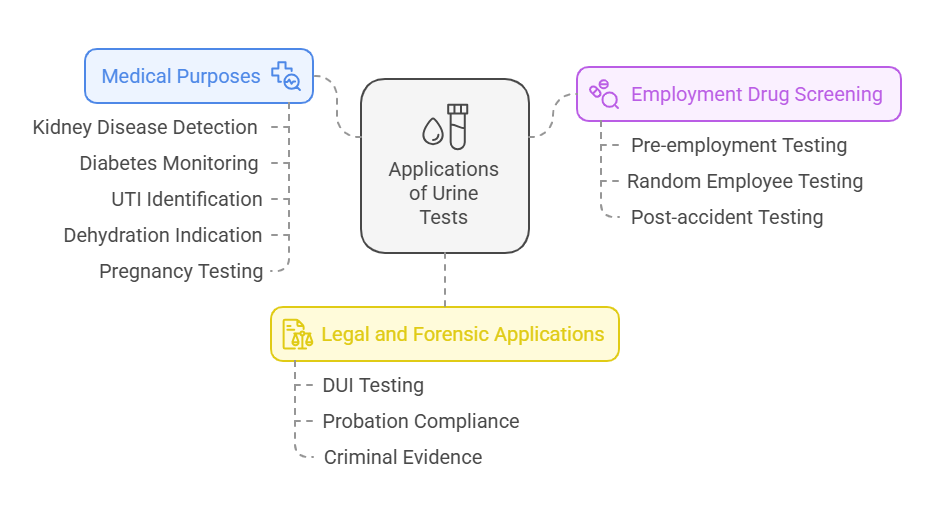
Urine tests are integral to a wide range of applications across various sectors, including healthcare, employment, and legal settings. They provide essential data that can help identify underlying health conditions, monitor treatment effectiveness, and confirm the presence of substances that may impact an individual’s ability to perform certain tasks. Below are some of the main reasons urine tests are commonly used.
1. Medical Purposes
Urine tests are fundamental in the diagnosis and monitoring of medical conditions. A routine urinalysis is part of regular health checkups and can provide early indicators of potential health issues. Some of the conditions that urine tests help detect include:
- Kidney Disease: Changes in the appearance, pH, or presence of certain substances like protein or blood in the urine can signal kidney disease or damage. Early detection allows for more effective treatment.
- Diabetes: Elevated glucose levels in the urine can be an early warning sign of diabetes, especially when blood glucose levels are not well-controlled.
- Urinary Tract Infections (UTIs): Urinalysis can help detect bacteria or white blood cells, which are indicative of an infection in the urinary tract.
- Dehydration: A highly concentrated urine sample may indicate dehydration, as the kidneys work to conserve water.
- Pregnancy: Urine pregnancy tests are one of the simplest and most reliable ways to detect pregnancy early.
In addition to diagnosing conditions, urine tests are also used to monitor patients with chronic diseases. For instance, patients with diabetes may undergo regular urinalysis to check for complications such as kidney damage. Similarly, people on medications that affect kidney function or blood pressure may be tested frequently to ensure the treatments are not causing adverse effects.
2. Employment Drug Screening
Pre-employment drug screening is one of the most common uses for urine testing. Employers, particularly in industries that require safety-sensitive positions (e.g., transportation, healthcare, construction), often require job candidates to undergo drug testing before finalizing their employment offers. This testing serves to ensure that new hires are not using drugs that could impair their ability to perform the tasks safely and effectively.
Additionally, many companies have policies for random drug testing of employees to promote a drug-free workplace. Post-accident drug testing may also be required in some industries to determine whether substance use played a role in a workplace accident.
Urine tests in employment drug screening are used to detect a wide array of substances. The most common drugs tested include:
- Marijuana
- Cocaine
- Opiates
- Methamphetamines
- Amphetamines
- Phencyclidine (PCP)
The results of these tests can significantly impact hiring decisions. A failed drug test might disqualify a candidate from employment or lead to the termination of an existing employee. Some employers may also conduct follow-up tests or additional screenings for those returning to work after a leave of absence, especially in safety-critical roles.
3. Legal and Forensic Applications
Urine tests are also crucial in legal and forensic contexts. Law enforcement agencies may require urine tests from individuals who are suspected of driving under the influence (DUI) or who have been involved in criminal activities. Probationers or individuals on parole may also be mandated to submit urine samples as part of their compliance with legal conditions.
For example, a DUI charge may result in mandatory drug testing to determine if a driver was under the influence of alcohol or drugs at the time of an arrest. In forensic settings, the results of urine drug tests are often used as evidence to support criminal charges or verify compliance with probation or parole conditions.
How Urine Tests Are Conducted
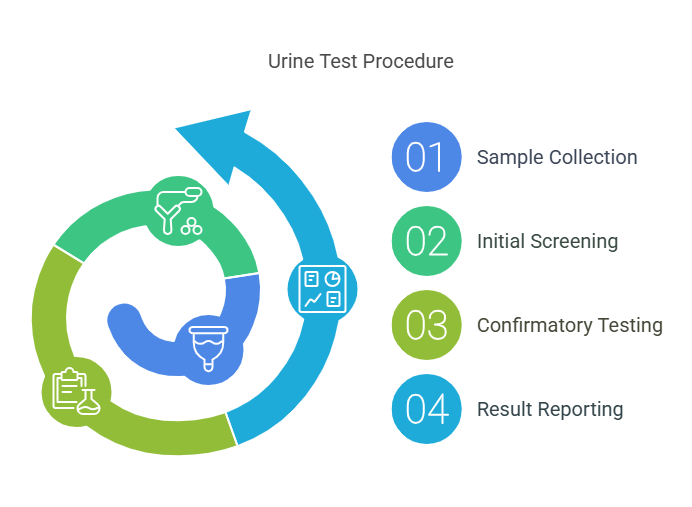
Urine tests are relatively simple to perform and are non-invasive, which makes them a convenient choice for screening and diagnosis. The steps involved in conducting a urine test generally include the following:
1. Sample Collection
The individual providing the urine sample is usually asked to void their bladder in a sterile container. The process is quick and straightforward. However, for drug testing, the collection process may involve additional safeguards to ensure the sample is legitimate and not tampered with. In some cases, a monitored collection may be required to prevent the use of adulterants or substitution.
The urine sample may be tested immediately on-site (for example, in a clinic or workplace testing facility), or it may be sent to a lab for more extensive analysis. When sending the sample to a lab, the integrity of the sample is crucial to ensure accurate results.
2. Initial Screening
For drug testing, most urine samples undergo an initial screening process using an immunoassay technique. Immunoassays are designed to detect the presence of drugs or their metabolites. While these tests are highly sensitive, they are not 100% accurate, which is why positive results are usually followed by more confirmatory tests.
3. Confirmatory Testing
If the initial screening test is positive for a specific substance, a confirmatory test is typically performed. The most common confirmatory method is Gas Chromatography-Mass Spectrometry (GC-MS), which is a highly accurate technique that can identify specific substances and their concentrations.
4. Result Reporting
Once the test is completed, the results are compiled, and a report is generated. For employment or legal purposes, these results are typically provided in a form that indicates whether the sample tested negative or positive for certain substances. In a clinical or medical context, results may include a more detailed analysis and interpretation.
How Long Does It Take for Urine Test Results to Come Back?
When it comes to urine tests, one of the most common questions people ask is, “How long does it take for a urine test to come back from the lab?” The timeline for receiving urine test results can vary depending on several factors, including the type of test being conducted, the testing method, and the efficiency of the laboratory. While some tests provide instant results, such as those used for drug screening in workplaces or medical clinics, more complex tests, particularly those involving laboratory analysis, may take longer.
Factors Influencing Urine Test Result Turnaround Time
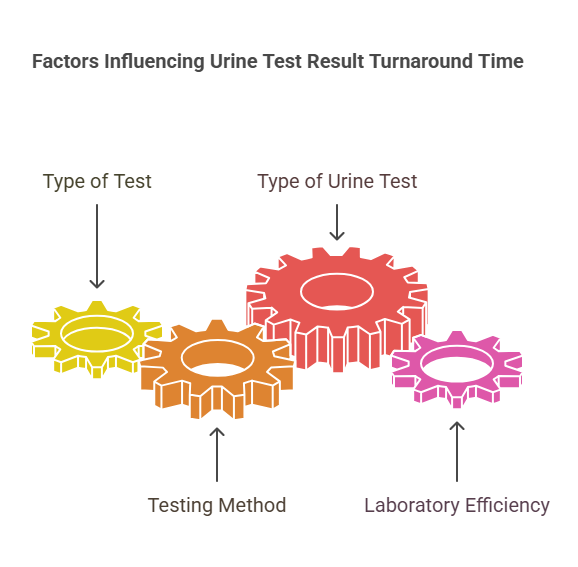
Several factors can influence how quickly urine test results are returned to the person or organization requesting the test. These include:
- Type of TestThe type of test being conducted plays a significant role in the turnaround time. Some urine tests, like basic urinalysis, can be processed on-site or at a clinic in a matter of hours, and the results are often available the same day. However, more detailed or specialized tests that require lab analysis, such as drug tests or pregnancy tests, generally take longer.
- Routine Urinalysis: This is typically a quick test and may take just a few hours to process, depending on the laboratory’s workflow.
- Drug Tests: Drug tests are often the reason for concerns about turnaround times. In most cases, an initial result can be available within a day or two, but if a confirmatory test like Gas Chromatography-Mass Spectrometry (GC-MS) is needed (which is common for drug screenings), it can take up to several days.
- Testing Method (On-Site vs. Lab Testing)There are two common testing methods for urine samples: on-site testing and lab testing. The method used can impact how long it takes to receive results.
- On-Site Testing: On-site tests are used in workplaces or medical clinics where rapid results are needed. For example, many employers implement instant drug tests for pre-employment screening or random checks. These tests typically use immunoassay-based technology, which can provide results within minutes. However, these tests may have a higher rate of false positives, so confirmatory lab testing is often required in case of a positive result. On-site tests are beneficial when quick answers are necessary, but they might not be as reliable as laboratory tests.
- Lab Testing: When urine samples are sent to a certified laboratory for analysis, the results usually take longer to process. In most cases, it can take anywhere from 1 to 5 days for results to be delivered, depending on the type of test and the laboratory’s workload. For instance, drug tests that require a confirmatory test (such as GC-MS) typically take longer, as this process is more thorough and involves more detailed analysis.
- Type of Urine TestThe specific substance being tested for can also influence how long it takes to get results. For example, a routine urinalysis might be completed quickly, while a drug screen could take longer based on the substances involved.
- Standard Drug Screens: Many standard drug tests, such as the 5-panel or 10-panel drug tests, check for common substances like marijuana, cocaine, amphetamines, and opiates. These tests are fairly common in employment drug screening and can usually be processed in a day or two.
- Specialized Tests: Tests for specific drugs or substances that require additional analysis, such as testing for synthetic cannabinoids or designer drugs, may take longer because of the need for more advanced equipment and procedures.
- Laboratory EfficiencyThe lab’s processing speed and internal workload can affect how quickly results are available. Larger, high-volume labs may have faster processing times compared to smaller facilities. Additionally, labs with more streamlined systems and greater technological advancements in testing will generally return results more efficiently.
- Large Laboratories: Laboratories with advanced technology and automated systems for processing samples tend to have faster turnaround times. They handle large volumes of samples and often provide results quicker than smaller labs.
- Smaller or Overwhelmed Labs: On the other hand, smaller laboratories or those experiencing an unusually high volume of samples may take longer to provide results. This is why it’s important to consider the lab’s reputation for efficiency when sending samples for testing.
How the Urine Testing Process Works
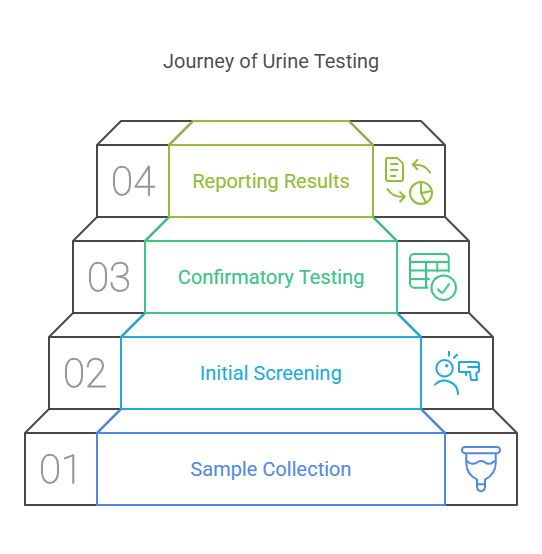
The urine testing process involves several key steps, from sample collection to result reporting. Understanding each of these steps can provide more insight into why results may take time to come back and how the entire process works.
1. Sample Collection
Urine testing begins with the collection of a urine sample. The sample must be provided in a sterile container to prevent contamination. Depending on the purpose of the test, the collection process might be monitored, especially in cases of employment drug testing or court-ordered drug screening, to avoid tampering or adulteration.
For routine medical urinalysis, the collection process is usually straightforward, and individuals can provide their sample at their convenience. For drug tests, however, the collection process may be more controlled to ensure integrity. The sample is then sealed and transported to the laboratory for further analysis.
2. Initial Screening (Immunoassay Test)
Once the urine sample reaches the lab, it undergoes initial screening using immunoassay-based methods. This screening test quickly identifies the presence of specific substances in the sample.
- Immunoassays are the most common technique used in preliminary drug testing. They are quick, simple, and cost-effective, but they are not always 100% accurate. For this reason, if the initial immunoassay test shows positive results, a confirmatory test is typically required.
3. Confirmatory Testing (Gas Chromatography-Mass Spectrometry)
If the initial screening test comes back positive, the lab typically conducts a more accurate confirmatory test, such as Gas Chromatography-Mass Spectrometry (GC-MS). This process separates and identifies the substances present in the urine sample, providing a more precise measurement of the drugs or metabolites detected.
- GC-MS testing is essential for verifying whether a positive result from the initial screening was correct. While this process takes longer (usually 1 to 2 days), it ensures accuracy and avoids false positives that may have occurred during initial screening.
4. Reporting the Results
After the sample has been processed and analyzed, the results are compiled into a report. Depending on the type of test (medical, employment, or legal), the results are either sent to the requesting individual, employer, or organization. In some cases, the lab will also provide an interpretation of the results, particularly in medical settings where results may need to be reviewed by a healthcare provider.
Exact Background Checks and Our Services
At Exact Background Checks, we understand the importance of accuracy, efficiency, and compliance when it comes to urine drug testing. Whether it’s for pre-employment screening, post-accident testing, or ongoing employee monitoring, we provide fast and reliable drug testing services that deliver accurate results. Our team works closely with certified laboratories to ensure that all urine tests are conducted in a secure, timely manner.
We offer a range of drug testing solutions, including on-site and lab-based testing. For drug tests that require lab analysis, we provide expedited processing and confirmation services to ensure that results are returned as quickly as possible, typically within 1-3 days. We also maintain strong compliance with federal regulations, state laws, and industry-specific standards to ensure that your testing processes meet legal and safety requirements.
In addition, we offer a variety of drug screening panels, from 5-panel drug tests to more comprehensive 10-panel tests, to meet the specific needs of different industries. Whether you need to test for basic substances or a broader range of drugs, our services cater to your requirements, providing detailed and reliable reports that you can trust.
Legal Aspects of Urine Testing
Urine testing, particularly in employment or legal contexts, is governed by various laws and regulations to protect individuals’ rights while ensuring fairness and compliance. Understanding these legal frameworks is crucial for both employers and employees.
1. Privacy and Consent Requirements
One of the primary legal considerations in urine testing is privacy. Individuals have the right to know why they are being tested and how their sample will be used. Employers or other requesting parties must obtain informed consent before conducting a urine test. Here’s how these requirements are typically structured:
- Consent Forms: Employers or testing organizations must provide a clear consent form that explains the purpose of the test, the substances being screened, and how results will be handled. This ensures transparency and avoids legal disputes.
- Monitoring During Collection: While urine collection for drug testing may require monitoring to prevent tampering, there are legal limits to how invasive this process can be. Testing organizations must adhere to state laws that regulate how closely an individual can be observed during sample collection.
- HIPAA Compliance: For tests conducted in medical settings, results are protected under the Health Insurance Portability and Accountability Act (HIPAA). This means that laboratories and medical practitioners must keep the results confidential and share them only with authorized parties.
2. Employment Testing Regulations
Urine testing is widely used in the workplace for pre-employment screening, post-accident testing, and random drug testing programs. Employers must adhere to federal, state, and industry-specific laws regarding drug testing.
Federal Guidelines
Under federal regulations, such as those set by the Department of Transportation (DOT), drug testing is mandatory for employees in certain industries, such as transportation, aviation, and defense. These regulations often outline:
- Specific drugs to be tested (e.g., marijuana, cocaine, opioids, amphetamines).
- Cutoff levels for positive results.
- Procedures for confirmatory testing and result reporting.
State-Specific Laws
State laws regarding urine testing vary significantly. Some states require that employers provide written notice of drug testing policies, while others restrict random drug testing unless it’s directly related to job performance or safety concerns.
Employer Responsibilities
Employers must clearly outline their drug testing policies in employment agreements or handbooks. Failing to inform employees or candidates about testing policies can lead to legal disputes. It’s essential for employers to:
- Notify applicants of pre-employment drug testing requirements.
- Use certified labs that follow strict testing protocols.
- Ensure compliance with all relevant legal guidelines.
3. Handling and Reporting Results
How results are handled and reported is another critical legal consideration. Laboratories must ensure that results are accurate and securely delivered to the requesting party. Employers must maintain confidentiality when reviewing and using these results.
- False Positives: If a urine test result comes back positive, the individual has the right to request a confirmatory test, such as GC-MS, to ensure accuracy. Employers must provide individuals the opportunity to dispute the results before taking adverse actions.
- Discrimination Concerns: Employers must apply drug testing policies uniformly across all employees or candidates to avoid discrimination claims. For instance, it’s unlawful to single out individuals for drug testing based on race, gender, or other protected characteristics.
FAQs About Urine Testing
What are the main types of urine tests and their purposes?
The main types are routine urinalysis (for kidney function, infections), drug testing (for substance use), pregnancy tests (for hCG hormone), and 24-hour urine collection (for detailed kidney analysis).
Why are urine tests commonly used in employment drug screening?
Urine tests are preferred for employment drug screening because they provide a reliable detection window for recent substance use, are relatively inexpensive, and are non-invasive
How long does it typically take to get urine test results back from a lab?
It varies; routine urinalysis can be hours, while lab-based drug tests usually take 1-5 days. On-site instant tests can be minutes, but often require lab confirmation.
What factors influence the turnaround time for urine test results?
Factors include the type of test, whether it's on-site or lab testing, the specific substances being tested for, and the efficiency of the laboratory.
What are the key legal aspects of urine testing, especially in employment settings?
Key legal aspects include privacy and consent requirements, compliance with federal guidelines (like DOT regulations), adherence to state-specific laws, and proper handling and reporting of results to avoid discrimination.
What are the main types of urine tests and their purposes?
The main types are routine urinalysis (for kidney function, infections), drug testing (for substance use), pregnancy tests (for hCG hormone), and 24-hour urine collection (for detailed kidney analysis).
Why are urine tests commonly used in employment drug screening?
Urine tests are preferred for employment drug screening because they provide a reliable detection window for recent substance use, are relatively inexpensive, and are non-invasive
How long does it typically take to get urine test results back from a lab?
It varies; routine urinalysis can be hours, while lab-based drug tests usually take 1-5 days. On-site instant tests can be minutes, but often require lab confirmation.
What factors influence the turnaround time for urine test results?
Factors include the type of test, whether it's on-site or lab testing, the specific substances being tested for, and the efficiency of the laboratory.
What are the key legal aspects of urine testing, especially in employment settings?
Key legal aspects include privacy and consent requirements, compliance with federal guidelines (like DOT regulations), adherence to state-specific laws, and proper handling and reporting of results to avoid discrimination.
Conclusion
Urine testing is an essential tool in medical diagnostics, workplace drug screening, and legal compliance. The timeline for receiving results can vary depending on the type of test, the laboratory’s efficiency, and the complexity of the analysis. Whether it’s a basic urinalysis or a detailed drug screening, understanding the process and legal considerations ensures transparency and accuracy.
At Exact Background Checks, we pride ourselves on offering fast, reliable, and compliant urine testing services. Our partnership with certified laboratories allows us to provide precise and timely results, tailored to meet the needs of both employers and individuals. Whether you’re conducting pre-employment screening, random drug testing, or post-accident analysis, our solutions are designed to support your compliance and operational needs.
Proper urine testing practices not only ensure fairness but also help organizations maintain a safe and drug-free environment. By understanding the factors that influence turnaround times and adhering to legal standards, both employers and employees can navigate the testing process confidently and efficiently.



